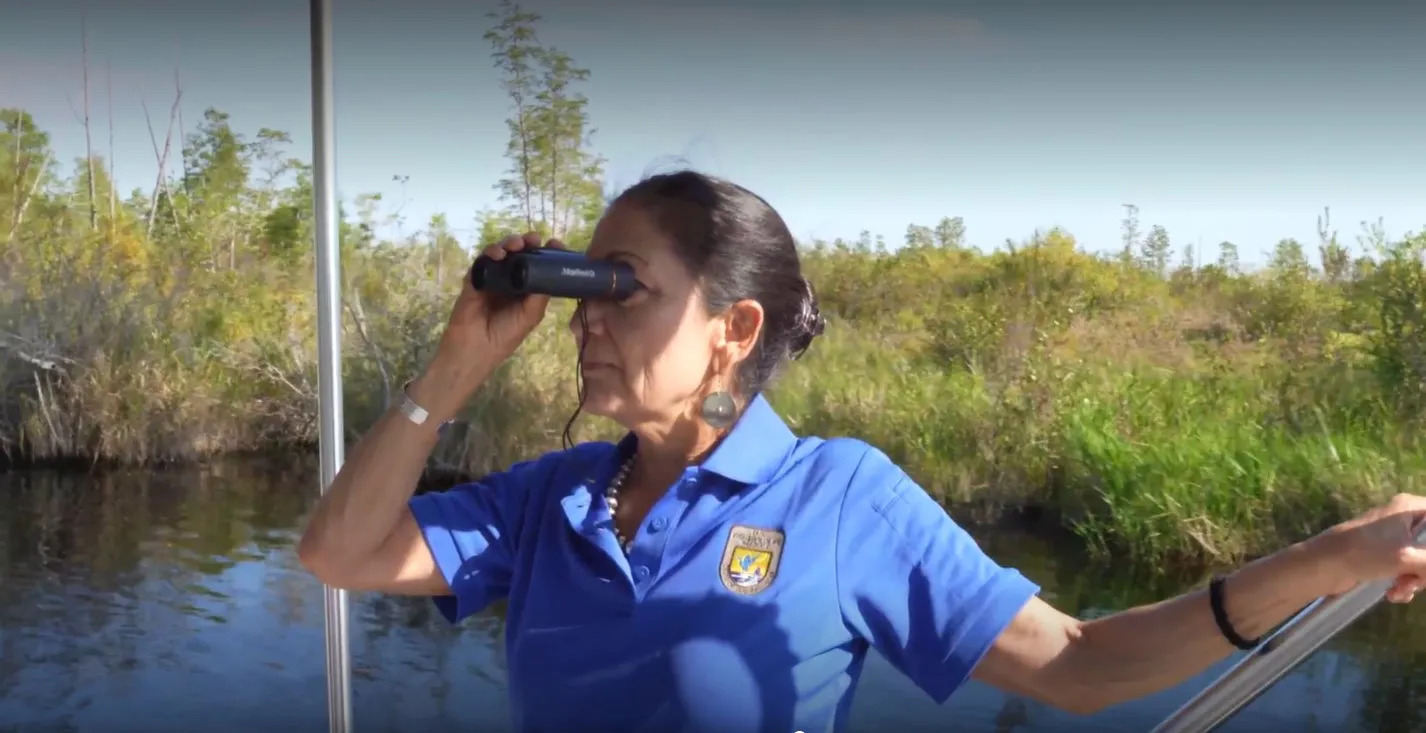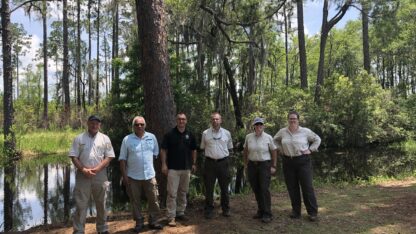Interior secretary's Georgia visit shines a light on Okefenokee supporters

A quarter century ago, then-Interior Secretary Bruce Babbitt visited the Okefenokee National Wildlife Refuge in southeast Georgia and denounced a nearby titanium strip mining project proposed by corporate giant DuPont before the company even applied for a single permit.
Babbitt’s visit marked a turning point in environmentalists’ efforts to protect the Okefenokee, the largest wildlife refuge in the Eastern United States. DuPont eventually backed off its mining plan and donated its 16,000 acres to The Conservation Fund.
On Friday, Interior Secretary Deb Haaland visited the Okefenokee as a newly revived mining proposal advanced by Alabama-based Twin Pines Minerals is making its way through the state permitting process. Her position carries no regulatory authority over the mine, but it does allow her to shine a spotlight on risks it poses to the swamp.
She and U.S. Sen. Jon Ossoff of Georgia, who openly opposes the mine, toured the refuge by boat, surveyed it by helicopter and heard from about 20 local leaders about the importance of protecting the refuge for the communities in the area.
Haaland departed without making a statement on mining or even speaking to activists gathered outside the Visitor’s Center. A press release issued after her visit didn’t address mining. Those hoping for a repeat of Babbitt’s performance are still hoping.
Among them was Josh Marks, an environmental attorney and leader of the fight against DuPont.
“I was there that day when Babbitt said that titanium dioxide was a very common mineral next to a very uncommon swamp, and that he was going to urge the company to abandon its plans,” Marks said. “He did, and they abandoned their project.”
“I urged her to, and fervently hope Sec. Haaland will, follow in Babbit’s footsteps, follow the lead of the scientific community who say that the Twin Pines’ mine will damage the swamp, and urge Gov. Kemp to deny the permit applications for this dangerous project,” Marks said.
Shifting responsibility
This round of the mining debate began in July 2019 when Twin Pines first sought a permit from the Corps of Engineers for mining heavy minerals on 12,000 acres of Trail Ridge, an ancient barrier island that forms an earthen dam east of the refuge. Public outcry against the plan was swift and loud, though Charlton County officials supported it.
The company withdrew that application the following March but quickly replaced it with a “demonstration project” of less than 1,000 acres. The slimmed-down project was meant to show that mining could be done without harming the refuge. But before the Corps finished its analysis, a Trump Administration change in the definition of wetlands meant the project no longer required a Clean Water Act permit from the Corps. Instead, in October 2020 the state EPD began processing the five state permits needed for the mine to get up and running.
In June of this year, the Corps reinserted itself in the process saying the agency had not consulted with the Muscogee Creek Nation as required. Twin Pines sued and the Corps settled, sending the decision-making process back to the state EPD in August. Muscogee Creek Nation Chief David Hill was among those who participated in Friday’s community conversation with Haaland.
Community voices
Haaland, a member of the Pueblo of Laguna, is the first Native American to serve as a cabinet secretary. She served as a U.S. representative from New Mexico from 2019-2021 before her confirmation as Interior Secretary in March 2021. In Congress, she focused on environmental justice and climate change among other issues, according to her biography at the Department of the Interior website.
Community members at the closed-door roundtable discussion at the refuge on Friday tried to convey to Haaland what the refuge means to them, several said afterward.
“This place was a sanctuary to the Blacks of the area, because there were so many places during segregation that we could not go,” said Deborah Reed, a local business owner who along with her cousin was the first to integrate Camden County High School where she was in the class of 1969.
Beaches were off limits to the young Reed, but Black churches organized trips to the Okefenokee where there were no color lines.
“This was one of the places that we could go, and we could actually be free,” Reed said. “Nobody told us we couldn’t do this. Do you understand how that felt?”
Growing up, Reed picnicked and enjoyed boat rides and even “adopted” an alligator she called “Lil’ Mo” who grew to be “Big Mo.”
Reed said it was important that Haaland toured the refuge.
“The swamp itself is a one-of-a-kind experience,” she said. “And when you look at it, if it don’t do nothing else but make you know that there’s a God, I don’t know nothing else that will. I’m serious. The Okefenokee is actually the soul, the spiritual being of this area.”
Rev. Antwon Nixon is the founder of the nonprofit Sowing Seeds Outside the Walls and the pastor of Mt. Carmel Baptist Church in Folkston. He emphasized to Haaland that the Okefenokee needs active support.
“The Okefenokee has sustained itself for many years without humans, and now the Okefenokee needs the humans because of humans,” Nixon said in recapping the conversation. “It did well, on its own, until we came into the picture. So now it’s back on us to make sure that we do the right, the responsible thing for what has been done wrong.”
After her visit, Haaland tweeted “In addition to its natural beauty, the world-renowned Okefenokee National Wildlife Refuge is home to diverse plants, birds and wildlife. It is vitally important to the Tribes and communities living in the area.”
Mining controversy
At its closest point Twin Pines’ proposed mining operation will be about 3 miles from the border of the 438,000-acre refuge. The company says, “The proposed mine poses no risk to the environment.”
Twin Pines did not immediately respond Friday to a request for comment on Haaland’s visit. The Alabama-based company did not participate in the community conversation. “Nobody from Twin Pines was invited,” spokesman Chip Stewart wrote in an email Saturday.
The Department of the Interior, which Haaland heads, stated last year in its analysis that the proposed strip mine “poses risks to the Okefenokee Swamp ecosystem, including the Okefenokee National Wildlife Refuge.”
Hydrology experts not involved in the permitting process have also weighed in with their concerns. Among them is C. Rhett Jackson, a top hydrologist at the University of Georgia, who has been a persistent voice warning of the danger of the mining project.
“There is no way to operate a large surface mine on Trail Ridge that is compatible with the most important regional land use, the Okefenokee Swamp USFWS National Wildlife Refuge” he wrote in a 2021 memo to the EPD critiquing the modeling used to analyze the mine’s effects on the swamp. In a more recent memo, Jackson outlined the deficiencies in the mitigation plan, concluding, “It is likely this mitigation plan will result in poor soil conditions, a low-productivity scrubby forest, and few, if any, wetland areas on the ridge top. Before mining, the site is over 50% wetlands.”
Earlier this year, bipartisan legislation to protect the Okefenokee was introduced in the Georgia General Assembly. The bill failed to receive a vote. Last month State Rep. Ron Stephens (R-Savannah) spoke at the Georgia Environmental Conference on Jekyll Island and vowed to renew the effort in the coming legislative session.
A recent poll of 625 registered Georgia voters by Mason-Dixon Polling on behalf of the Georgia Water Coalition indicated high support for protection of the Okefenokee with 69% responding that Georgia’s Governor should take “immediate action” to protect the Okefenokee swamp from “risky mining proposals.” Full polling results are available on Georgia Water Coalition’s website: www.gawater.org/okefenokee-swamp.
Although no comment period has yet opened for the state permits, the EPD has received more than 27,000 comments, most of them urging denial of the permits. A sampling is available at these links: 1, 2, 3, 4, 5, and 6.
This story was provided by WABE content partner The Current.








